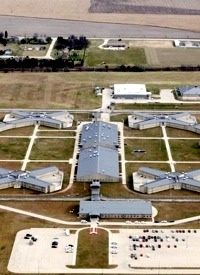
The Obama administration announced plans on December 15 to acquire the Thomson Correctional Center in Thomson, Illinois, to house terrorism suspects currently being held at the U.S. naval base at Guantanamo Bay, Cuba, which now houses about 200 inmates. Officials explained that President Obama ordered the federal government to acquire the correctional center — located about 150 miles northwest of Chicago — as part of efforts to close Guantanamo.
VOA news reported that the 1,600-cell prison was built in 2001 to house maximum-security inmates, but is now nearly empty. Illinois Governor Pat Quinn and U.S. Senator Richard Durbin (D-Ill.) had promoted the federal purchase of the prison, saying it would create thousands of jobs in the economically distressed area.
The Washington Post noted that the Obama administration’s decision was made despite the objections of congressional Republicans and from some residents of Illinois, who feared that the transfer could make the state a target for terrorists. The Post quoted Rep. Mark Kirk (R-Ill.) who called the move "an unnecessary risk."
Senater Minority Leader Mitch McConnell (R-Ky.) released a written statement after the decision was made public, asserting that a bipartisan majority in Congress "already rejected bringing terrorists to U.S. soil for long-term detention."
"The administration has failed to explain how transferring terrorists … will make Americans safer than keeping these terrorists off of our shores in the secure facility in Cuba," said McConnell.
McConnell neglected to follow the protocol required of every cub reporter and police spokesperson by failing to use the qualifying adjective “alleged” before “terrorists,” since not one detainee has been formally charged with a crime, much less convicted of one.
The administration official who announced the decision claimed that instead of increasing our nation’s risk to terrorists, the transfer would, instead, reduce it, asserting that closing the detention center at Guantanamo Bay "is essential to protecting our national security and helping our troops by removing a deadly recruiting tool from the hands of al Qaeda."
The detention camp has been harshly criticized by human rights advocates for the alleged abuse and mistreatment of the detainees, and news leaks from the detention facility about coercive interrogation techniques such as waterboarding has fueled anti-American sentiment in the Middle East and elsewhere.
The Los Angeles Times reported that under the administration’s plans, some Guantanamo detainees will be sent to their home countries and others to third-party countries that operate rehabilitation programs for terrorism suspects. The administration has also considered operating a military tribunal at or near the prison, where combatants charged with acts of terrorism could be tried.
The diametrically opposed opinions expressed regarding the wisdom of closing the Guantanamo facility and moving some detainees to domestic prisons emanate from two opposing camps that could be described as follows:
1.) Supporting the decision are “liberal Democrats” who seem to have retained some semblance of respect for the civil liberties protected by the Bill of Rights (in this case the Sixth Amendment), yet who habitually ignore most of the rest of the Constitution, particularly the Tenth Amendment, which affirms the Constitution’s principle of federalism by mandating a “strict” interpretation of the powers granted to the federal government.
2.) Opposing the decision are the mostly Republican, supposedly conservative (whatever that term has come to mean!) “neoconservatives” who give frequent lip-service to the concept of limited government concerning domestic programs, but who in recent years have continued the extra-constitutional policies initiated by Democrat President Harry Truman to engage in war without a constitutionally required congressional declaration of war.
Aside from waging war without a formal declaration, the neo-con agenda also includes using the open-ended war on terror as justification for suspending several guarantees provided by the Bill of Rights, including the aforementioned Sixth Amendment and also the Fourth Amendment’s prohibition of unreasonable searches and seizure — adopted as a result of the bad experience Americans had during their War for Independence, when the notorious writs of assistance (general search warrants) were issued.
The Bush administration came under strong criticism not only from Democrats, but from constitutionalists of all political stripes, for its use of warrantless wiretaps — a clear violation of the Fourth Amendment. (For background, read, “The Emerging Police State”.)
However, there are few “good guys” or “bad guys” in today’s debate between the major political party leaders, most of whom have little compunction about transforming our federal government into a freedom-robbing leviathan. Until most Americans realize that the ultimate objective of terrorists is not to hijack airplanes or destroy buildings, but to goad our own government into taking away our freedom, neither the war on terror nor the fight for freedom will ever be won.
If we suspend our freedom in the name of fighting terrorism, we will have surrendered to the same terrorists we profess to be fighting.
Photo of Thomson Correctional Center: AP Images



